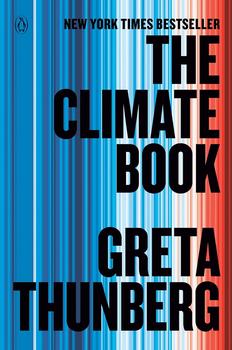Summary | Excerpt | Reviews | Beyond the Book | Readalikes | Genres & Themes | Author Bio

The Facts and the Solutions
by Greta Thunberg1.1
To solve this problem, we need to understand it.
Greta Thunberg
The climate and ecological crisis is the greatest threat that humanity has ever faced. It will no doubt be the issue that will define and shape our future everyday life like no other. This is painfully clear. In the last few years, the way we see and talk about the crisis has started to shift. But since we have wasted so many decades ignoring and downplaying this escalating emergency, our societies are still in a state of denial. This is, after all, the age of communication, where what you say can easily outweigh what you do. That is how we have ended up with such a great number of major fossil-fuel- producing – and high-emitting – nations calling themselves climate leaders, despite not having any credible climate mitigation policies in place. This is the age of the great greenwashing machine.
There are no black-and-white issues in life. No categorical answers. Everything is a subject for endless debate and compromise. This is one of the core principles of our current society. A society which, when it comes to sustainability, has a lot to answer for. Because that core principle is wrong. There are some issues that are black and white. There are indeed planetary and societal boundaries that must not be crossed. For instance, we think our societies can be a little bit more or a little bit less sustainable. But in the long run you cannot be a little bit sustainable – either you are sustainable or you are unsustainable. It is like walking on thin ice – either it carries your weight, or it does not. Either you make it to the shore, or you fall into the deep, dark, cold waters. And if that should happen to us, there will not be any nearby planet coming to our rescue. We are completely on our own.
It is my genuine belief that the only way we will be able to avoid the worst consequences of this emerging existential crisis is if we create a critical mass of people who demand the changes required. For that to happen, we need to rapidly spread awareness, because the general public still lacks much of the basic knowledge that is necessary to understand the dire situation we are in. My wish is to be part of the effort to change that.
I have decided to use my platform to create a book based on the current best available science – a book that covers the climate, ecological and sustainability crisis holistically. Because the climate crisis is, of course, only a symptom of a much larger sustainability crisis. My hope is that this book might be some kind of go-to source for understanding these different, closely interconnected crises.
In 2021, I invited a great number of leading scientists and experts, and activists, authors and storytellers to contribute with their individual expertise. This book is the result of their work: a comprehensive collection of facts,stories, graphs and photographs showing some of the different faces of the sustainability crisis with a clear focus on climate and ecology.
It covers everything from melting ice shelves to economics, from fast fashion to the loss of species, from pandemics to vanishing islands, from deforestation to the loss of fertile soils, from water shortages to Indigenous sovereignty, from future food production to carbon budgets – and it lays bare the actions of those responsible and the failures of those who should have already shared this information with the citizens of the world.There is still time for us to avoid the worst outcomes. There is still hope, but not if we continue as we are today. To solve this problem, we first need to understand it – and to understand the fact that the problem itself is by definition a series of interconnected problems. We need to lay out the facts and tell it like it is. Science is a tool, and we all need to learn how to use it.
We also need to answer some fundamental questions. Like, what is it, exactly, we want to solve in the first place? What is our goal? Is it to lower emissions, or to be able to go on living as we are today? Is our goal to safeguard present and future living conditions, or is it to maintain a high consumption way of life? Is there such a thing as green growth? And can we have eternal economic growth on a finite planet?
Right now, many of us are in need of hope. But what is hope? And hope for whom? Hope for those of us who have created the problem, or for those who are already suffering its consequences? And can our desire to deliver this hope get in the way of taking action and therefore risk doing more harm than good?
Excerpted from The Climate Book by Greta Thunberg. Copyright © 2023 by Greta Thunberg. All rights reserved. No part of this excerpt may be reproduced or reprinted without permission in writing from the publisher.
The good writer, the great writer, has what I have called the three S's: The power to see, to sense, and to say. ...
Click Here to find out who said this, as well as discovering other famous literary quotes!
Your guide toexceptional books
BookBrowse seeks out and recommends the best in contemporary fiction and nonfiction—books that not only engage and entertain but also deepen our understanding of ourselves and the world around us.